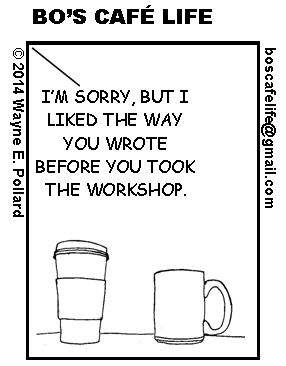Writing can be a lonely business. I know I’m preaching to the choir here but it bears repeating because we, as writers, sometimes don’t know how else to write except alone. But how do we improve? Getting outside help is one of the best ways to take your writing to the next level and make it less of the fantasy that it is in your head and more of the reality it could be. One of the most noted ways to improve your writing, especially if you are still in school or university, is to join a class or group that workshops stories.
I hate to break it to you but a writing workshop can be amazingly harmful if you’re not blessed with above-average classmates and led by a great facilitator (usually a teacher but not always).
Let’s define terms to make sure we’re all talking about the same thing: a writing workshop group, often offered by a Creative Writing or Literature course at a school or university, is primarily aimed at giving its students the opportunity to workshop, or present, a draft of some work-in-progress to a group of like-minded peers who can offer constructive feedback. So let’s go through that definition, piece-by-piece:
Workshops: The Good and the Bad
A work-in-progress (in writing, that is any piece of writing because, let’s face it, even stuff that’s published can be improved with more tinkering), usually a 10-50 page, double-spaced writing exercise of some kind (longer than that gets to be a little intense for a workshop setting), that is sent to the rest of the group (anywhere from five to thirty other classmates) to read before the day you “present” your piece. Note that you can sometimes find groups like this outside of a school setting but the most structured ones tend to be in schools.
Good workshops:
- Do not allow the author to speak while others give feedback
- Participants are instructed to ignore grammar and focus on larger “global” edits, such as motivation, theme, character development, plot
- Must offer one positive thing the writer did and should continue doing, and one thing that can be improved upon in future edits
- Are not emotional or “feeling”-based critiques such as “I don’t like this and I don’t know why” but rather “I don’t feel this is effective because…” The “because” is the most important part of the critique
- Reference a particular illustrative section of the piece during feedback so that the writer can see exactly what the feedback is referring to
Bad workshops:
- No one speaks because no one has bothered to read the piece. Everyone is waiting that one person who managed to read two pages before class started and will get the ball rolling when the silence becomes oppressive
- Everyone speaks at once with no control from the facilitator (usually the teacher), leading to tangents and side quest-like conversations where the writer receives zero useful feedback
- The author interrupts critique to defend any and all choices in the piece
- Prep members ahead of time on the “type” of writing the piece is attempting and to note how the piece can “evoke a mood.” This clouds the reader’s interpretation of the story and will give you tainted feedback
- Feedback involves phrases like “This reads like this one story I wrote, except this one doesn’t do it as well, try to be more like that”, “I just don’t like her, I don’t really know why,” “you should consider having more stuff happens, it gets kind of slow in parts”
Here’s the cold, hard truth about writing workshops: if you do not collect a group of people who are invested in your improvement as a writer, that group of people will not help you improve. If the end goal is a good grade, they will offer their very subjective feedback about what they do or don’t like about your story with no thought or care for what your vision is.
If their end goal is to help you make the amazing story you want to write, they will look at your piece in context: is it a short story? Is it a chapter of a longer narrative? Is it backstory meant to explain the bigger plot? That kid who came in late, still wearing his pj’s and marking up his copy of your story while the teacher is doing attendance isn’t going to care about your metaphors or overarching plot. He likes thrillers and explosive scenes, not nuanced dialogue and foreshadowing. Or worse, he loves your genre and has all kinds of things you should try because they worked in five other novels he read recently. Because all you need to do is copy everything that has been published in the past ten years.
So What You’re Saying is Workshops Are Bad?
Can be bad. Often bad. Not always! You need to consider a few things as a writer before joining a workshop group. Generally speaking, you could have a fantastic writing group with people of different genres but in general, it helps if you work with people who are:
- Dedicated to writing to the same level of intensity that you are
- Brutally honest with you about what works and doesn’t work, and know how to communicate this to you with your best intentions at heart
- Get what you are trying to do and are familiar with your genre
Look for groups of two to four (more than that will make the group too large and difficult to offer equal attention to everyone in the group). Set priorities and goals. Create accountability in the group. In a future post, I’ll get deeper into how a writing group can take your writing to the next level.

Excuse me, please come host my creative writing circle.
LikeLike
You know I would whip all of those little writers into shape!
LikeLike